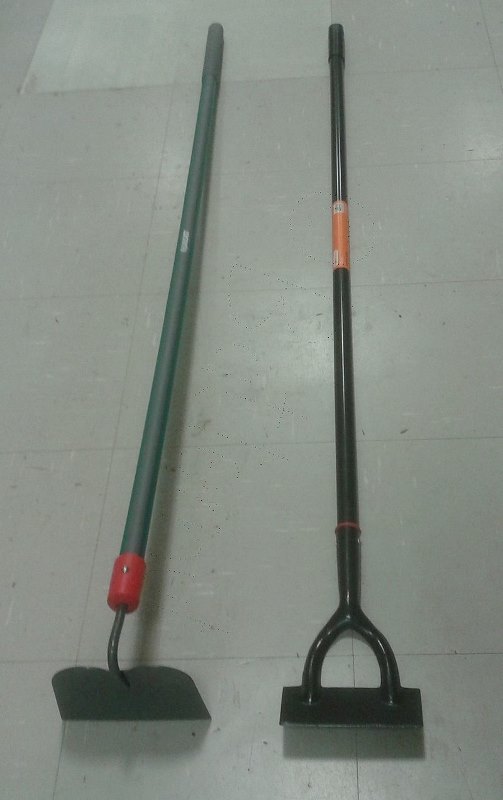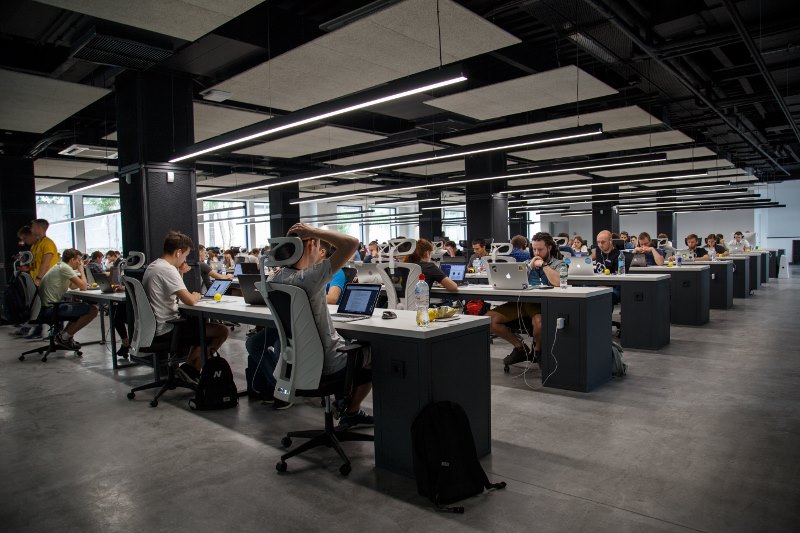It’s work experience week and Ceri, who’s in Year 10, has spent the week in a work environment. Well, I say a ‘week’ but it’s Friday and she didn’t have to go in today… But she’s 14, and I do find myself wondering; what’s the point of work experience at her age?
I remember when I was in the 4th year, what is now year 10, and having to go through the process myself. We had to fill in a questionnaire, which was used to determine our likely fields of employment. This would then be used to help ensure we got the best possible placement.
My questionnaire suggested I would be best suited to a career in one of the following:
- The armed forces
- The police
- The fire brigade
Naturally, then, I was given a week’s placement with Van Heusen. Now, in case you’re thinking Van Heusen is some sort of high end private security contractor, no. No, it isn’t.
Van Heusen is, and I quote, “the best selling dress shirt brand in the world.”
At the time, Van Heusen had a factory in Victoria Street in Taunton. And, so, I spent a week honing my suggested career path of uniformed service by helping fill orders for dress shirts. Thrilled, I was not.
There was some suggestion from the school that part of the point of work experience was to fill my placement. But we’d only moved to Taunton the previous year and we knew remarkably few local business owners. And none that were looking to have a work experience kid. The Queen was, and remains, in charge of the armed forces and she never got back to me.
On top of that, like so many other 14 and 15 year olds, I didn’t have the rest of my life planned out. I had a vague idea that I might join the army but that wasn’t an option for work experience. So, it seemed that I was entered into the school lucky dip and drew, formal torso wear.
My only real memory of the experience was being given a list of shirts to collect from the warehouse and a hoe.

By Batternut – Own work, CC BY-SA 4.0, https://commons.wikimedia.org/w/index.php?curid=40563984
The hoe was needed to get the boxed shirts from the highest shelves. Because this was quicker than getting the ladders. The technique was to kind of flick the edge of the box with the blade of the hoe, such that the box landed in your arms. I’m vague on the technique because when I did it, the top of the box caught on the hoe, dropping the bottom of the box on my head and the shirt on the floor. They still made me do it, though. Fun times!
Julie, on the other hand, has better memories of her work experience. She wanted to be a veterinary nurse, so she wrote to vets about getting a placement. And got one. She then spent a happy week working with animals. Julie was even provisionally offered a job, delayed until after college. She lived in the buttock end of nowhere, at the time, so couldn’t start working at the vets until after she could drive, at 17. 17 was half way through college, so she decided to do ‘A’ Levels. By the end of her ‘A’ Levels, she wanted more of a career than veterinary nursing could offer, so never took the job.
So we both did work experience. Julie was engaged with the process and I was not. But neither of us added anything immediately useful to our lives from the particular placements we had. which brings me back to: what’s the point of work experience?!
Surely, the point of work experience should be immediately obvious to, at least, the Government, but, apparently not. The first thing I found was an archived Direct Gov page, which listed the benefits of work experience as including:
- your opportunity to spend a period of time outside the classroom, learning about a particular job or area of work.
- find out what skills employers look for when they’re hiring someone to fill a job vacancy.
- the chance to develop your self-confidence and communication skills.
With the exception of the bit about the ‘opportunity to spend a period of time outside the classroom’, in my experience, this is clearly just so much tripe. Being sent to a company for work experience is not the same as being hired. Self confidence and communications skills are hard to come by when it’s raining dress shirts. Maybe, if you already know what you want to do with your life, there’s less tripe involved, but otherwise…

More recently, in 2017, the Department for Education produced a research report entitled: Work experience and related activities in schools and colleges. This piece of joy runs to 102 pages!
The overall aim of the study was to, ‘consider current provision and operational practice of work-related activities at schools and colleges in England.’
The report asked schools and colleges what they thought was the benefit of work experience, and the schools and colleges responded with:
- communication and interpersonal skills (97%), and;
- increased confidence (95%)
Schools, rather than colleges, also identified:
- a better understanding of the world of work as a key benefit.
Which sounds like déjà vu, all over again.
This is actually recognised by the report, which states:
Despite its previous and almost ubiquitous use in the education sector, both the outcomes and value for money of work experience have often been questioned, partly because its purpose has never been fully articulated and agreed between education institutions and employers.
What’s the point of work experience, then? Nobody knows! It’s just something that’s always been done. It is, however generally accepted to be a useful part of education, at least anecdotally. Equally, not being able to attend work experience is considered detrimental to a pupil’s educational development.
The report concluded that there was ‘widespread acceptance’ of the importance of work experience by the schools, but there was lack of guidance from Government. And that Government needs to issue guidance about what constitutes good practice.

What I noted about the report was that, despite being over 100 pages long, no one found time to ask the pupils what they thought. There was a lot of input from the school coordinators and a fair amount from employers but nothing from the kids… To be honest, I wasn’t that surprised.
As an employer, who has had pupils in to do work experience, I remain unconvinced about the importance and success of the programme. Over the course of three years, the company provided work experience for one of my nieces, my daughter Emma and one of Emma’s friends.
On all three occasions it was because there was no other placement available for them, and it was us or nothing. None of them had any real interest in our field of work, although the admin work is fairly universal. It was also something of a challenge for us to fill their time effectively, without having a member of staff sit with them full time.
All tasks require training to get right. Trying to get someone in work experience doing something different every day means that they always need someone sitting with them. This is not ideal in a busy office.
The process is made that much more difficult by the fact that the person on work experience is 14 or 15, in year 10. This is very young in terms of both insurance and Health and Safety. Particularly if the work involves visits to site.
So, it’s obvious then; what’s the point of work experience? Not much!
Except… that’s not right.
Ceri was been interested in joining the medical profession for a while now. She managed to secure a place at Musgrove Park Hospital and has been reinvigorated in her plans to take up, what she describes as, doctoring.
And I’ve checked with Emma and her friend, and they’ve both said that they found their time at our office useful. If only from the point of seeing what it’s like doing admin in an office. That we paid them at the end of their respective weeks probably didn’t hurt either.

It seems, then, that work experience can have benefits. Maybe I was just unlucky. I’ve asked my brothers their experiences and, in both cases, it did not have a positive impact on their future working lives. It seems the whole process is a bit hit and miss.
Ceri explained that she had to get a placement because if she didn’t, she’d have to spend the week in school writing essays about the point of work experience. So, if the report is right, and missing work experience has a detrimental impact on education, this sort of punishment seems unduly cruel.
It will come as no surprise that the whole work experience programme is underfunded, because, of course it is. Everything relating to schools and education is underfunded!
What is a surprise is the lack of Government guidance and leadership. For example, this year, the Department for Education has managed to issue guidance on Data Protection; providing suggested privacy notices. Yet it’s never had time to issue guidance on Work Experience!?
The upshot of this, is the hit and miss approach I mentioned earlier. Some pupils will benefit from work experience, particularly if they know what they want to do and then get a placement in that field. If, however, pupils don’t know what they want to do and end up somewhere they find boring, or don’t get a placement at all, then it’s a complete waste.

The lack of guidance makes this difficult to overcome, particularly for Year 10 pupils. If Government made it clear that they wanted businesses to provide placements and what was expected to be offered in these placements, more pupils would have a meaningful experience. If the pupil knows what they want to do.
Some work experience programmes are run in college, in year 12. This makes far more sense to me, for a number of reasons:
- Pupils will have a better idea of the career they want and be better able to seek appropriate placements;
- Pupils will be 16 and 17 and better able to travel independently to more distant placements;
- Businesses will face fewer problems, in terms of insurance and Health and Safety, and;
- Pupils will more comfortable making their own arrangements for placements, if necessary.
It’s also likely to be easier on parents. Getting kids to and from work experience placements, in and around work, can be a challenge. In short, there is far more chance of both pupils and businesses getting something meaningful out of work experience, if it’s done in Year 12.
Particularly if Government actually issues some guidance…
If asking about the point of work experience in Year 10? For about half the kids, it’s a chance to get out of the classroom. For the other half, it’s a useful experience.
However, if asking, what’s the point of work experience in Year 12? A lot! It’s actually helpful to pupils and business. There is also a much greater possibility of the pupil actually ending up getting a job where they did their work experience.
While not all schools actually offer Year 10 work experience, most do. And there is always going to be a reasonable chance that this will simply be a waste of time.
The thing to do, though, is to attend a college that also offers work experience in Year 12. Even if you’ve already done it in Year 10. The Year 12 version has a much higher potential to be useful and may even lead to a job. Something not to be sneezed at, in this day and age.
If you don’t plan to go to university, do plan to go to a college that offers work experience in year 12. Maybe get yourself a job offer. That’s the point of work experience.
